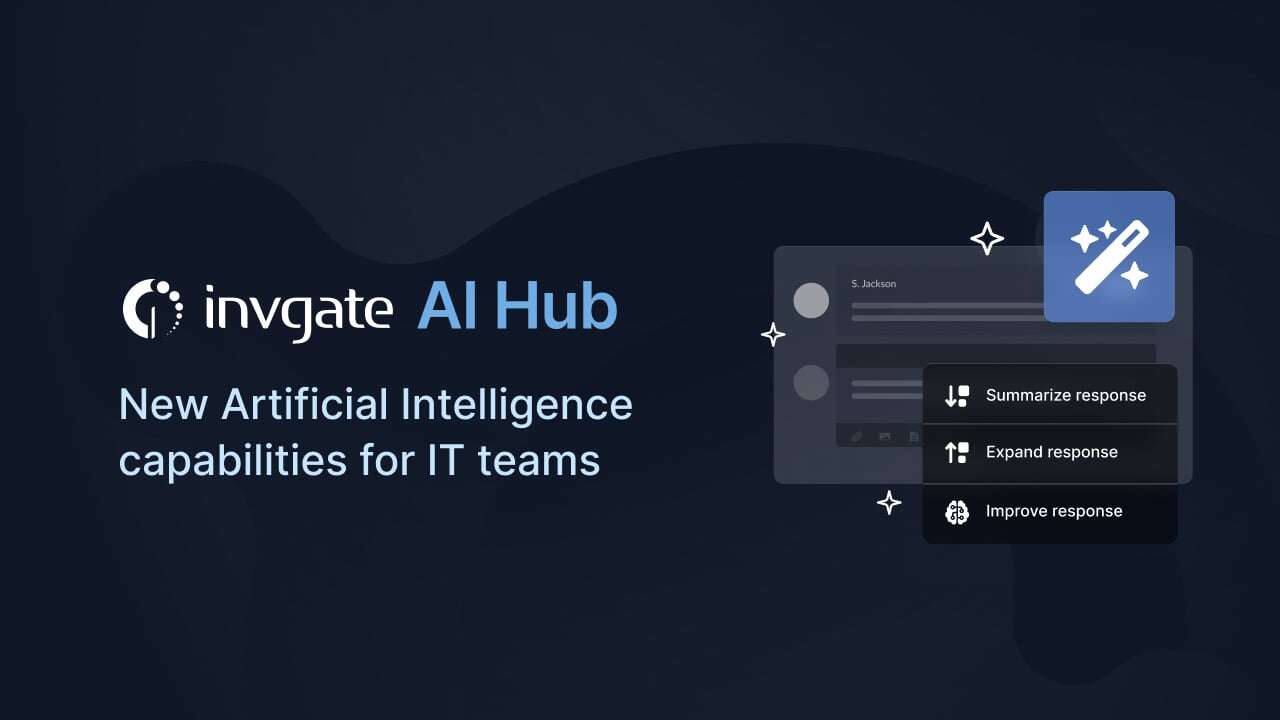We know that artificial intelligence (AI) is here to stay. It has improved daily business processes across all sectors: teams can save time, avoid repetitive tasks, and achieve greater productivity overall with the help of AI software.
AI software has changed how companies operate, make decisions, and interact with customers. This article explores various AI software solutions designed to meet diverse business needs.
Keep on reading to see how you can too leverage AI with these powerful tools.

Definition and types of AI software
Artificial Intelligence software is a computer program that leverages AI techniques to perform tasks and simulate human cognitive abilities. These models are used in various applications, such as weather predictions, creative work, Knowledge Management, personal assistance, and enterprise search.
Such programs can learn from data, recognize patterns, reason in different situations, make decisions, and solve problems with minimal human intervention. AI can learn by processing large volumes of information, which allows it to identify patterns and relationships.
As a result, it has the potential to improve its performance over time. In fact, it uses what it has learned to make logical inferences and reach evidence-based conclusions. It even tackles complex problems and offers creative solutions. It also understands and responds to natural language, facilitating intuitive interactions that closely resemble those between humans.
Main types of AI software
The main types of AI software include:
- Generative AI: programs capable of creating new content, such as texts, generated images, or music. Based on deep learning models, which are trained with large amounts of data, it enables the generation of new information.
- AI-based tools: software that uses Artificial Intelligence to enhance existing processes or functions. Designed to simulate cognitive processes such as learning, reasoning, problem-solving, and perception, they use algorithms to analyze large volumes of data and learn patterns.
- AI software: comprehensive systems that perform complex tasks or decision-making processes. These programs use complex algorithms to learn from data, recognize patterns, and reach conclusions.

Benefits of using AI software
Implementing AI software in business operations can lead to significant advantages:
-
Automation of daily tasks, freeing up human resources for more strategic work.
-
Provision of valuable insights through data analysis and pattern recognition.
-
Increased revenue potential: a McKinsey report estimates that generative AI could generate value equivalent to $2.6 trillion to $4.4 trillion in global corporate profits annually
-
Enhanced innovation capabilities, allowing businesses to stay competitive in rapidly changing markets.
-
Improved operational efficiency across various departments.
These benefits highlight how investing in AI software can benefit your business. However, for successful AI adoption, it is important to choose the right AI technologies. Some of the top AI consulting firms offer strategic guidance to help businesses seamlessly adopt AI software.
AI tools for business operations
AI chatbot solutions
Chatbots have become integral to modern customer service strategies. Two notable solutions in this space are:
-
ChatBot: An AI-powered customer support solution that streamlines processes and enhances customer satisfaction. It's one of the best AI chatbots out there. It can handle multiple queries simultaneously, providing quick and accurate responses.
-
Conversica: This AI software is designed to empower customer success teams. It can engage with customers proactively, identify upsell opportunities, and enhance the overall customer experience.
-
Customers.ai: A multi-channel chatbot platform that integrates with SMS, web chat, and popular messaging apps. It offers a unique "OmniChat" feature that allows businesses to manage all conversations from a single inbox, regardless of the channel.
-
Aivo: This AI chatbot specializes in natural language processing in multiple languages, making it ideal for global businesses. Its standout feature is the ability to understand and respond to colloquialisms and regional expressions.

AI-powered tools for sales and marketing
AI is transforming sales and marketing efforts, making them more efficient and effective. To get the most from these tools, many teams also turn to AI-powered SEO guidance. AI powered sales and marketing solutions automate routine tasks, improve personalization, and free teams to focus on strategic work:
-
Jasper: An AI text generator for marketers that offers a range of templates and incorporates industry best practices. It can help create compelling marketing copy, blog posts, and social media content.
-
Tome: This AI software is designed to simplify presentation creation. It’s ideal for sales teams looking to streamline their presentation process, allowing them to focus more on strategy and less on design.
-
Drift: An AI-powered conversational marketing platform that goes beyond chatbots. It uses real-time personalization to engage website visitors, book meetings, and qualify leads automatically, integrating seamlessly with popular CRM systems. Additionally, Google Ads can be integrated with AI-powered marketing tools like Drift to help businesses grow and reach customers around the world.
-
Persado: This AI tool focuses on emotional language optimization for marketing content. It analyzes and generates text that resonates with specific audience segments, claiming to increase engagement by up to 400% compared to human-crafted copy.
Generative AI for content creation
Generative AI is pushing the boundaries of creativity in content creation. It simplifies video creation processes with customizable templates and AI-powered tools, enhancing existing footage and creating marketing material efficiently.
- Freepik AI Image Generator: generates high-resolution visuals from simple text prompts. Whether you need illustrations or product mockups, this tool consistently delivers photorealistic, 3D, cartoon, and flat designs. Seamlessly integrated with Freepik’s AI assets, the tool allows you to download or remix content without leaving the platform. It's ideal for marketers, educators, and designers working at scale.
-
DALL-E: An advanced AI image generation system based on text descriptions. It’s a powerful tool for creating unique visuals for marketing campaigns, product designs, or conceptual art.
-
Midjourney: Another generative AI software that transforms text descriptions into vivid images. It’s particularly useful for businesses needing to generate visual content for various purposes quickly.
-
Synthesia: An AI video generation platform that creates professional-looking videos from text input. Its unique feature is the ability to use AI-generated presenters who can speak in multiple languages, making it ideal for creating localized content at scale. AI tools like Synthesia can create videos from text or prompts, offering convenience and high-quality video production.
- Gptzero.me: A widely recognized AI detector that helps businesses, educators, and marketers identify whether text has been generated by AI or written by humans. For marketing teams, this tool ensures the authenticity and originality of content before it’s published, safeguarding brand credibility
- Essay Humanizer: A writing refinement tool that converts AI-generated text into clear, natural, and human-like language. It helps content creators, students, and professionals produce readable articles without losing meaning or tone. AI Humanizer ensures every sentence sounds authentic, improving clarity and engagement for marketing copy, blogs, and academic content alike.
AI tools for meetings and productivity
AI is also enhancing workplace productivity and communication:
-
Otter AI: An AI-powered meeting assistant that summarizes video and audio calls and provides transcripts. It's invaluable for teams looking to capture and share important information from meetings.
-
Notion AI: This AI-powered text generator and editor is integrated within the Notion platform. It can help with writing, brainstorming, and organizing information more efficiently.
-
Fireflies.ai: An AI meeting assistant that not only transcribes and summarizes meetings but also integrates with popular project management tools. Its unique "AskFred" feature allows users to ask questions about past meetings and get instant answers.
-
Reclaim.ai: This AI scheduling tool goes beyond basic calendar management. It uses machine learning to understand your work patterns and automatically schedules tasks, breaks, and focus time, adapting to your changing priorities and habits over time.
- Krisp: An AI meeting assistant that removes background noise, enhances audio clarity, and ensures distraction-free meetings for users across various platforms.
- Sheetcast: A tool to turn Excel spreadsheets into web apps, allowing businesses to boost productivity.
- Getrecall.ai: Uses AI-powered active learning strategies and spaced repetition techniques to help users capture, organize, and retain information more effectively, which enhances focus, comprehension, and long-term learning outcomes.
-
Activeloop: Chat with PDF AI Allows users to instantly interact with their documents, simply upload a PDF and ask questions to extract insights, summaries, or key data within seconds.
AI software for talent acquisition and management
AI is transforming how businesses manage their human resources:
-
Eightfold: This platform enables users to enhance workforce management processes, including talent retention, upskilling, reskilling, and efficient recruitment. It uses AI to match candidates with the right roles and identify skill gaps within organizations.
-
SeekOut: This software streamlines talent acquisition, management, and analytics for HR teams. It uses AI to source candidates, analyze workforce data, and provide insights for strategic HR decisions.
- Marlee: Marlee is an AI-powered platform that helps organizations attract, assess, and develop top talent by uncovering work motivations and team fit. Beyond hiring, it supports ongoing talent management with personalized online coaching and insights that build high-performing, engaged teams.
Other use cases for AI software
AI solutions for financial management
AI is revolutionizing financial management, offering more accurate forecasting and streamlined processes:
-
Datarails: This AI-powered software automates financial reporting and planning by seamlessly integrating with familiar Excel spreadsheets and financial models. It provides real-time insights and reduces the risk of human error.
-
Planful: A comprehensive finance performance management software trusted by CFOs worldwide. It uses AI to enhance budgeting, forecasting, and financial analysis processes.

AI tools for logistics and supply chain
In logistics and supply chain management, AI is optimizing operations and improving efficiency:
-
Transmetrics AI: This AI software optimizes logistics planning and Asset Management through predictive analytics and AI technology. It can forecast demand, optimize inventory levels, and improve route planning.
-
Throughput: The software provides a comprehensive view of the entire supply chain, from raw material sourcing to final product delivery. By analyzing historical data and current trends, ThroughPut AI can forecast demand, identify potential bottlenecks, and predict supply chain disruptions before they occur.
AI tools for code generation and development
Even software development is benefiting from AI:
-
GitHub copilot: An AI-powered tool designed to enhance coding productivity. It suggests code completions and entire functions based on the context of what a developer is working on.
-
Amazon AI code whisperer: This tool provides real-time code suggestions based on user comments and existing code. It can significantly speed up the development process and reduce errors.
Conclusion: Implementing AI software for your business
AI software solutions are revolutionizing industries across the board and will play a dominant role in shaping the future of business. New AI software is emerging daily, and businesses need to stay up-to-date with the latest developments.
AI can help businesses achieve greater productivity and speed and drive innovation across diverse industries. But remember: successful implementation requires careful planning, employee training, and a clear understanding of how AI can best serve your specific business needs.
As we move forward, the businesses that effectively integrate AI into their operations will likely gain a significant competitive advantage.















